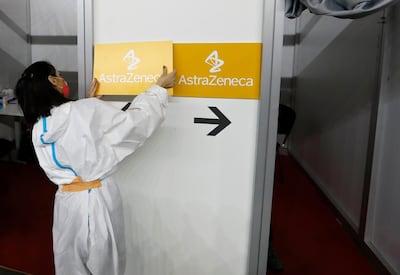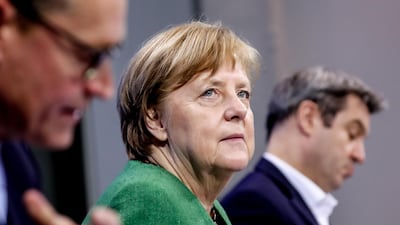Germany's chancellor backed the European Commission president's threats to block the export of AstraZeneca's Covid-19 vaccines produced in the EU.
Angela Merkel on Tuesday extended Germany's lockdown until April 18 to try to curb a third wave of infections fuelled by the coronavirus variant first identified in the UK.
She said the country faced a race against time to vaccinate its population as the feud with AstraZeneca over supplies rumbled on.
“I support Commission President Ursula von der Leyen. We have a problem with AstraZeneca – we will decide responsibly,” Mrs Merkel said.
European officials are furious that AstraZeneca was able to deliver its UK contract in full while falling short on supplying the bloc.
In her tough warning to the pharmaceutical giant, Ms von der Leyen said the message to AstraZeneca was “you fulfil your contract with Europe first before you start delivering to other countries”.
She said AstraZeneca delivered only 33 per cent of the 90 million vaccine doses promised for the first quarter of the year.
Much of the EU's frustration stems from supplies to Britain, where AstraZeneca has production facilities and the inoculation campaign is progressing at a much faster pace.
Brussels accused London of operating a de facto export ban to achieve its vaccine success, a claim denied by Prime Minister Boris Johnson's government.
Mr Johnson said he hoped a negotiated solution could be found.
"We in this country don't believe in blockades of any kind of vaccines or vaccine material," he told a news conference.
"It's not something this country would dream of engaging in and I'm encouraged by some of the things I've heard in the continent in the same sense."
Mrs Merkel said she and French President Emmanuel Macron discussed the issue with Mr Johnson, who sent a Foreign Office delegation to the EU headquarters in Brussels on Tuesday for talks.
The UK is prepared to negotiate the division of stocks of an active ingredient produced in a Dutch factory, The Times reported.
European rifts were exposed on Sunday when Irish Prime Minister Micheal Martin said the EU's threats would be a retrograde step and risked retaliation from Britain.
“I’ve met all of the companies and it’s absolutely vital that we keep supply chains open,” he told TV broadcaster RTE.

The UK government said its target of vaccinating all adults by the end of July remained on track, despite the EU threats.
A drop in supply is expected next month due to delays in deliveries of the AstraZeneca vaccine from the Serum Institute in India.
Meanwhile, AstraZeneca’s vaccine suffered another blow on Tuesday after a US health agency raised concerns that the company might have included out-of-date information during clinical trials.
AstraZeneca said its Stage 3 trials in the US showed the vaccine was 79 per cent effective at preventing Covid-19.
But the National Institute of Allergy and Infectious Diseases, which is headed by Anthony Fauci, questioned the authenticity of the claim.
“AstraZeneca may have included outdated information from that trial, which may have provided an incomplete view of the efficacy data,” it said.
Last week, the EU medicines regulator deemed the vaccine safe and effective after several countries suspended its use over blood clot concerns.
The hangover from that debate persists, with France recommending the shot only be used in over-55s, and some Nordic countries vowing to carry out their own investigations before deciding whether to lift the suspensions.

